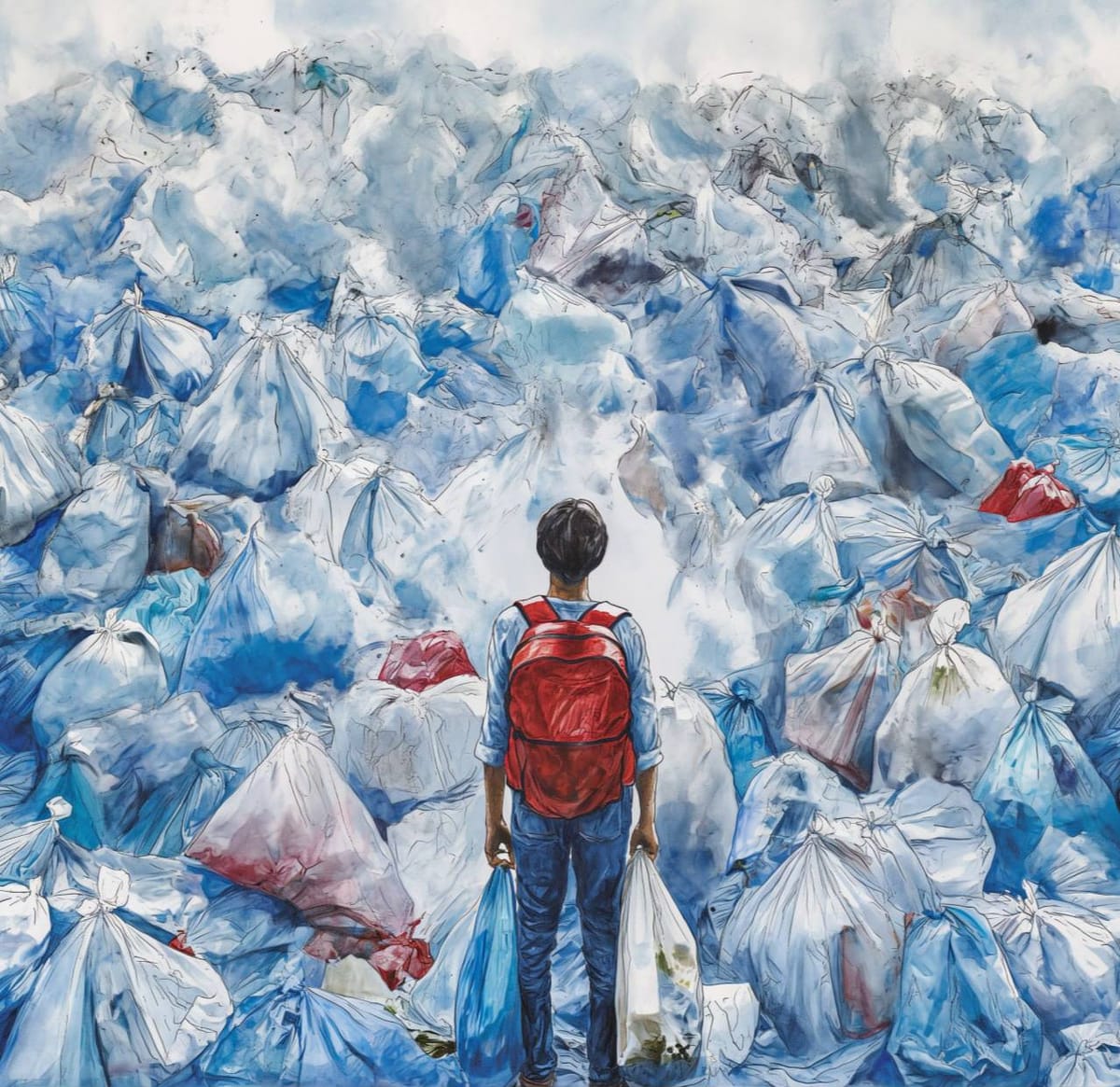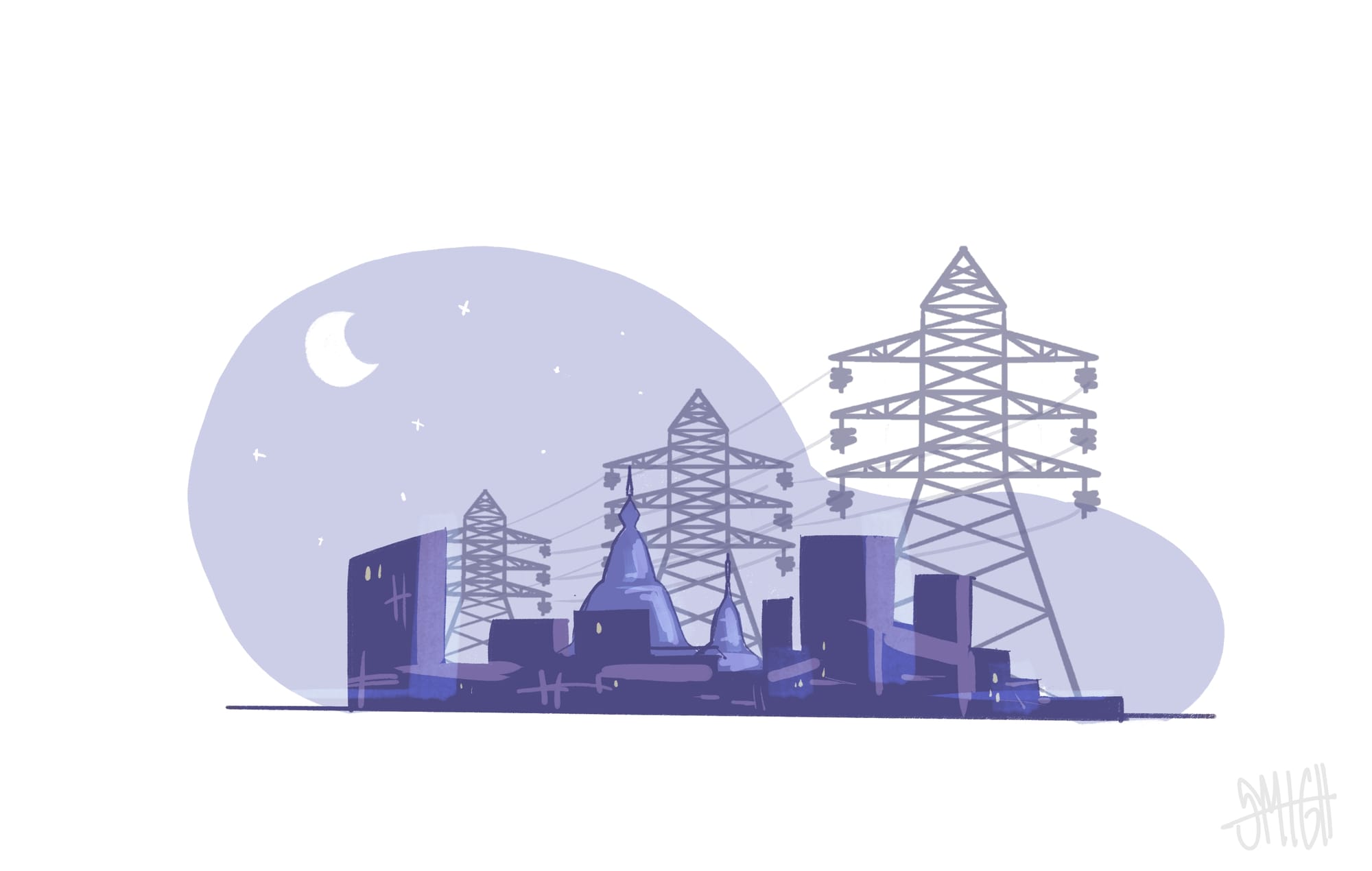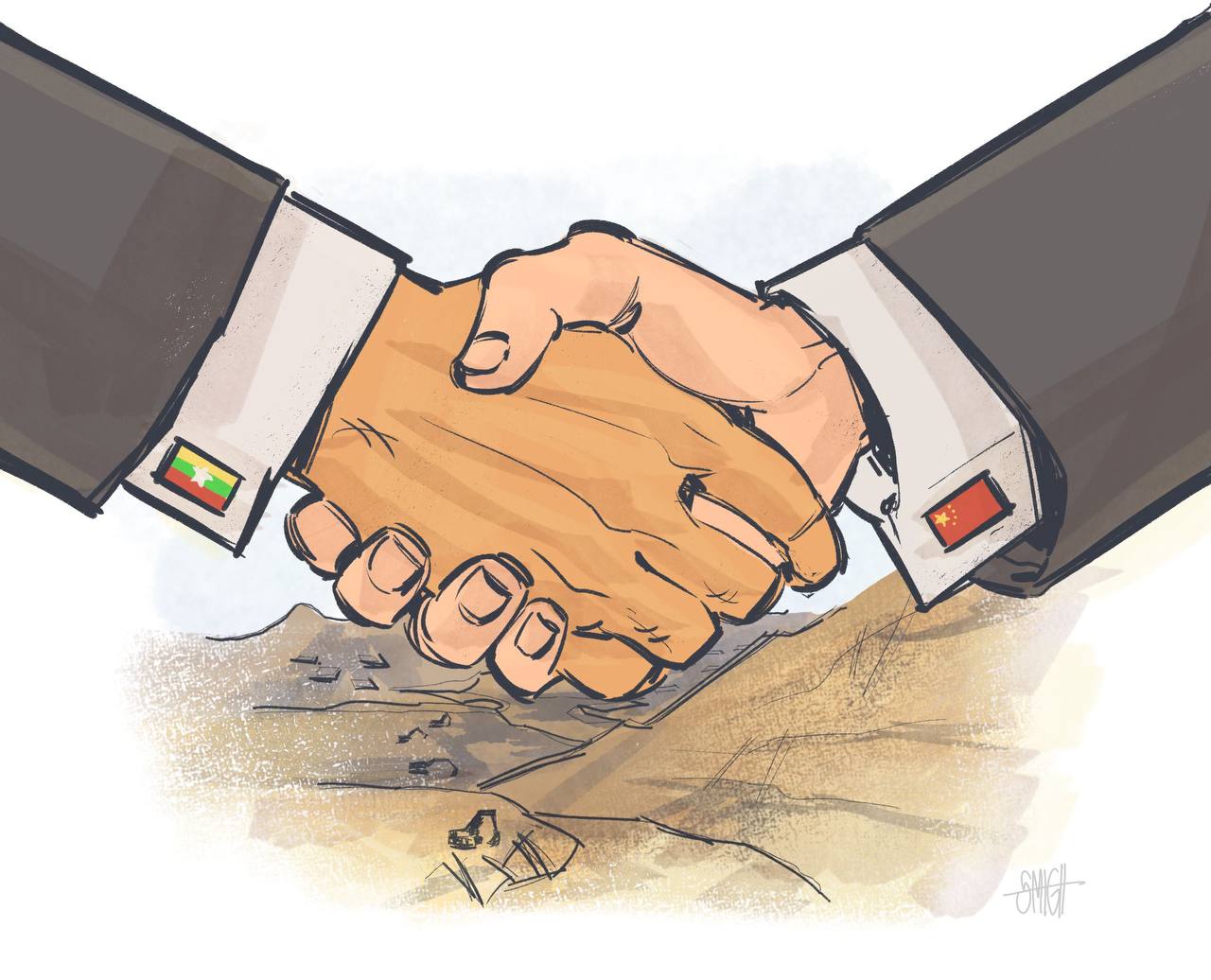
As a manual laborer living in Shwepyithar city, it might be almost impossible to go to a country like England, but trash from England can easily reach the front of his house in Myanmar.
As soon as you step out of the house, the piles of garbage greeting you and the terrible odors floating in the air dominate the squatter areas of Shwepyithar. When the city was established, according to the urban plan, there were many vacant lots created to put a park in every 100 households, but now it has become a threat.
That threat is the garbage piles that have unceremoniously taken over the vacant lots where there is no human habitation and no parks have been created.
Garbage piles in Shwepyithar
There are four official places to dispose of garbage in Yangon. The Htein Pin garbage dump in Hlaing Tharyar, the Htawei Chaung garbage dump in East Dagon, the Dala waste disposal site in Dala, and the Seikgyikanaungto waste disposal site in Seikgyikanaungto. Yangon produces an average of about 2,500 tons of garbage per day. These four existing garbage dumps also have their own problems of not having enough space for garbage. So, the vacant lots of Shwepyithar, where there is no human habitation yet, have become another good place for illegal garbage dumping.
In Shwepyithar, there wasn't that much garbage before. It was only after 2021 that the garbage became mountainous. Although the factories within Shwepyithar are responsible for this garbage, the factories alone cannot be blamed entirely.
Among these garbage are brands like Lidl, Unico Penne Rigate, Foremost, Kasztelan, Spomlek, and Oikos. These brands are famous products from Western countries. Interestingly, these products are not available in supermarkets in Myanmar, nor are they imported into Myanmar. However, the Netherlands-based Lighthouse Reports news agency was able to reveal after a six-month investigation that trash from thousands of miles away on the western side of the world had arrived in Myanmar as a trade item.
Garbage trade
In today's world, all kinds of goods and products are circulating around the world, trading back and forth. Among these trade items is garbage. To be precise, plastic waste is also a type of trade item.
Today's world produces over 300 million tons of plastic waste per year. So, there is a need to clear these. Thus, garbage trade has emerged to recycle waste. Garbage trade is when a country that wants to dispose of garbage imports it to receiving countries that will recycle and reuse it.
The country that accepts the most plastic waste in the world is China. China has been importing 45% of the world's garbage since 1992. They recycle this garbage and reproduce plastic.
However, because there is also garbage that cannot be recycled, unusable garbage has to be piled up. These garbage piles increase over time. There are impacts on people's health and the environment. That's why China officially closed garbage imports in 2017.
Myanmar becoming a garbage dump
When China closed garbage imports, international garbage urgently needed a place to accept them.
Because it's difficult to recycle garbage and the cost of disposal is high, garbage trade turned to Southeast Asian countries. At that time, poor Myanmar with weak rule of law became the best place to dump garbage. Garbage that was being sent to China started entering Myanmar en masse.
According to UN Comtrade, the world's largest trade information website, from 2017 to 2022, more than 114,000 tons of garbage worth over 70 million US dollars were exported to Myanmar from countries around the world. In 2021 alone, the year of the military coup, nearly 7,500 tons of international garbage entered Myanmar.
The route of garbage inflow
Looking at the route of international garbage entering Myanmar, it is Thailand. Plastic waste officially enters through the two Thai-Myanmar Friendship Bridges, and also illegally enters through ports along the Thaungyin River.
According to the current transshipment agreements in Thailand, goods to be sent to a third country can not only be imported into Thailand but can also be transported to various places within Thailand. From there, they are exported to the third country that will receive the goods. Therefore, Thailand has become the most suitable transit country for sending international waste to Myanmar. This method can also obscure the route of the goods.
There are 23 countries exporting garbage to Myanmar through Thailand. There are Asian powerhouses like Japan, China, South Korea, as well as powerful Western countries like the United States, England, Germany, and Spain.
Among these countries, except for the United States, all other countries are signatories to the Basel Convention.
Basel Convention
The Basel Convention is a global agreement that controls international waste trade. This agreement has been signed by all United Nations member states except the United States, Timor, Fiji, and South Sudan.
The new amendment to the agreement bans the export of hazardous plastic waste. Even if mixed waste is to be exported, it must only be exported to countries that can properly dispose of it. There are also requirements that receiving countries must be notified in advance before sending.
However, the international garbage entering Myanmar does not comply with any of the Basel Convention's requirements. Looking at Myanmar's current laws, this garbage is also illegal.
In 2019, under the democratic government, plastic waste was added to the list of goods requiring import licenses, and trade was closed. Licensed plastic businesses for recycling and production were allowed to import with restrictions.
After the military coup, this trade permission became lifeless. Licensed importing companies were no longer publicly announced. The number of businesses and how much they are ordering and importing has disappeared like drawing in the air.
Therefore, the trade permission that was banned as illegal has become active and seemingly legal.
The final destination of international garbage
It's true that the international waste entering Myanmar goes to recycling factories within the country. Local plastic factories also prefer high-quality waste from international sources over domestic waste. Local business owners have to buy imported waste by the container. Because everything comes mixed, not all imported waste can be recycled and used. So, business owners have to burn, bury, and dispose of it. Only about 10 percent can be burned and buried, and most of it is disposed of in landfills. Even for disposal, they have to pay a monthly fee to the municipal authorities for permission to dispose.
After the military coup, amid weak supervision and corruption, the vacant lots of Shwepyithar have become places to dump garbage. The wards with the most garbage are Ward No. 11 and Ward No. 27. The authorities also pressure the residents of these wards to sign, saying they understand and accept that waste will be disposed of in their neighborhood environment.
By the nature of plastic, the longer it stays between soil and water, the more toxic it becomes. Within two years after the coup period, locals have started to experience the negative effects from the garbage. Due to the garbage, there have been drainage blockages causing water logging, sewage system damage, and groundwater deterioration. Due to the decline in water quality, there have been skin itching and skin-related diseases.
The main problem is the terrible odor coming from the garbage piles. Inhaling such terrible odors almost daily can severely affect respiratory health in the long run. Chemical reactions that have already permeated between soil and water can also lead to diseases like cancer.
No one is taking responsibility for these dangerous Shwepyithar garbage dumps that have become such a hazardous environment. The companies exporting the garbage and their respective countries are staying silent as if they don't know about this issue. Similarly, the companies that import for their own interests are turning a blind eye to this issue as if it doesn't concern them.
While they have strict laws regarding plastic in their own countries, Thailand, which is sending to Myanmar through transshipment trade, has also denied that they have any responsibility. The main responsible party, the Myanmar military council, is completely ignoring this.
Big international companies need a place to clear their garbage. At that time, Myanmar is poor and unstable in many aspects. With decreased rule of law within the country, plus conflicts and instability, international garbage will continue to exploit Shwepyithar. But the international waste in Shwepyithar is not just Shwepyithar's problem. It has become Myanmar's problem.
Although environmental observers, experts, human rights organizations, and Lighthouse Reports, which investigated the garbage trafficking, have extensively exposed this issue, not even a single visible action has emerged.
The people of Shwepyithar are still living trapped among the garbage piles. They dare not raise objections about the garbage problem. Between the military council's wrath and the threat of garbage being dumped in front of their homes, they have no choice but to choose the garbage.
Among the piles of international garbage that have moved en masse without needing passports, visas, or permissions, Shwepyithar has become unable to be a golden land anymore.
Nu Thit Moe (Y3A)
Read More:
 Build Myanmar - MediaY3A
Build Myanmar - MediaY3A
 Build Myanmar - MediaY3A
Build Myanmar - MediaY3A
Build Myanmar-Media : Insights | Empowering Myanmar Youth, Culture, and Innovation
Build Myanmar-Media Insights brings you in-depth articles that cover the intersection of Myanmar’s rich culture, youth empowerment, and the latest developments in technology and business.
Sign up for Build Myanmar - Media
Myanmar's leading Media Brand focusing on rebuilding Myanmar. We cover emerging tech, youth development and market insights.
No spam. Unsubscribe anytime.
Sign up now to get the latest insights directly to your mailbox from the Myanmar's No.1 Tech and Business media source.
📅 New content every week, featuring stories that connect Myanmar’s heritage with its future.
📰 Explore more:
- Website: https://www.buildmyanmarmedia.com/
- Facebook: https://www.facebook.com/buildmyanmar
- YouTube: https://youtube.com/@buildmyanmarmedia
- Telegram: https://t.me/+6_0G6CLwrwMwZTIx
- Inquiry: info@buildmyanmar.org
#BuildMyanmarNews #DailyNewsMyanmar #MyanmarUpdates #MyanmarNews #BuildMyanmarMedia #MyanmarNews #GlobalNews #TechNewsMyanmar #BusinessNewsMyanmar #Updates #Insights #Media
